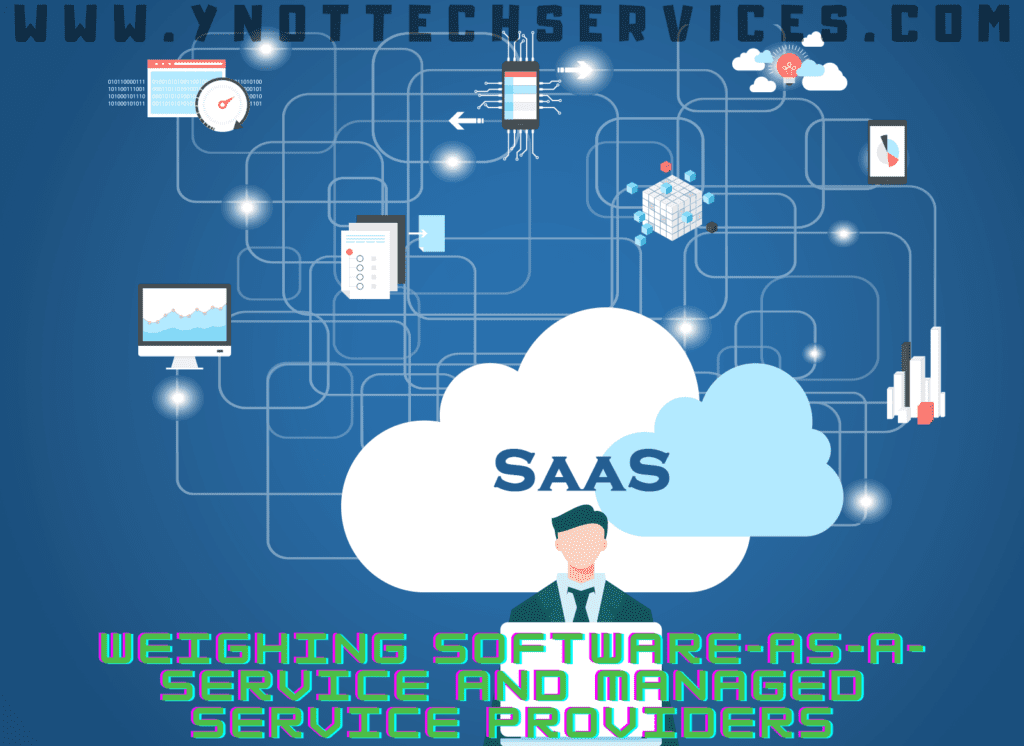Weighing Software-as-a-Service and Managed Service Providers
There are many acronyms in the IT world. Two common ones are SaaS and MSP, which stand for software-as-a-service and managed service provider, respectively. The bigger question is what the differences are between these two and why you would need one or the other. Here’s help.
What’s SaaS?
Your business may already be relying on SaaS. Some of the more widely used platforms include:
- Microsoft 365
- Salesforce
- HubSpot
- MailChimp
- Shopify
- SurveyMonkey
- Canva
- Slack
SaaS companies are booming. Businesses are relying more and more on these technologies, and SaaS spending has grown 50% in two years. Why?
Software as a Service provides customers with convenience. The companies develop, manage, and update a product to support teams such as marketing, sales, or customer service. The SaaS platform will promise greater efficiency, improved productivity, increased transparency, and more. These tools automate and streamline processes to drive revenue.
Customers typically pay for a cloud-based subscription fee. In return, they get lower-cost services, reduced time to implementation, and scalability.
What’s an MSP?
Managed services support software, as well as your networking and hardware infrastructure. The MSP has human experts to install software, upgrade hardware, patch systems, and track security. The MSP provides all-around support for the business’s technology. This third-party firm gets to know you to help keep your business competitive.
The MSP tackles all sorts of tasks behind the scenes for your business. When your business outsources its IT to an MSP, you gain efficiencies and expertise. You are not giving up control but adding a partner to focus on time-consuming, complicated, and repetitive tasks. Meanwhile, your people can concentrate on driving innovation and generating revenue.
Businesses reap many rewards from working with an MSP. These experts can often find cost savings. Most MSPs charge a predictable monthly fee that’s easy to budget around. The enhanced expertise can also help ensure security and compliance. The MSP will also have the know-how to recommend the tools your business can enjoy most.
It doesn’t have to be either-or
Understand that you don’t have to choose between SaaS and an MSP – the two work well together.
MSPs can help you deploy and get the most out of your SaaS. In fact, an MSP can make sure your SaaS solutions work well together. They can help identify features on one platform that you’re not using. This could lead to you dropping an underutilized subscription to another SaaS.
Going on your own with SaaS means relying on each company’s IT support or asking your own in-house IT people to get to know the ins and outs of many different platforms. When you have an MSP, you pay that single provider for help instead of having to spend on tech support for each SaaS. Also, if you have a security issue, the MSP will alert you and act to cut the damage and repair the problem. The SaaS manufacturer doesn’t have the same responsibility.
Before you even get SaaS, the MSP can help guide your purchase. Your business may think it needs Slack because everyone else seems to be using it. But if you already have Teams, that could be unnecessary. The MSP learns about your business and how you work to help determine what SaaS’s are right for you.
The latest-and-greatest SaaS will come and go. Your MSP can remain the same as your business changes and evolves. Providing continuity of service, they will keep an eye out for the new SaaS you can adopt. The SaaS company wants to grow its customer base and evolve its platform, and the MSP’s job is to help your business succeed, with or without SaaS.
Book an appointment today to enjoy the many benefits of working with an MSP.



